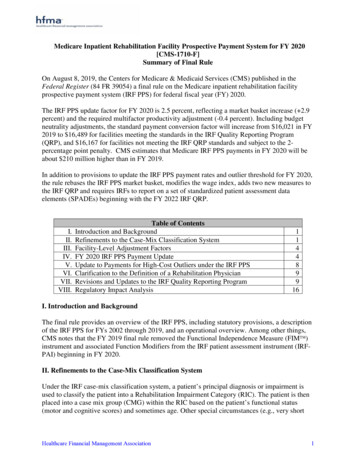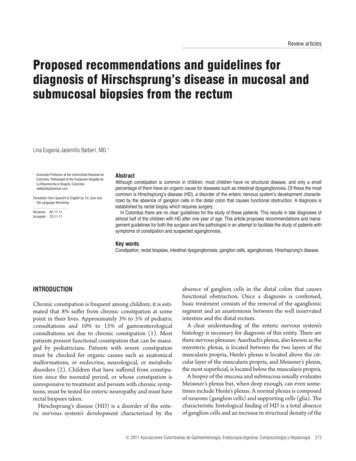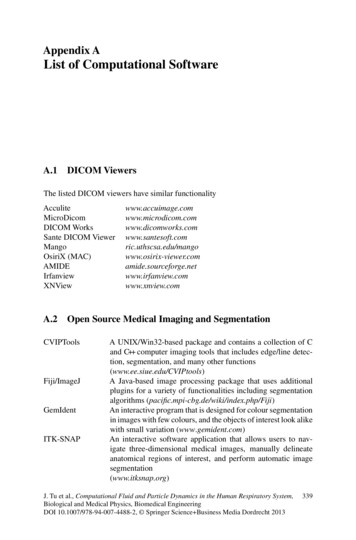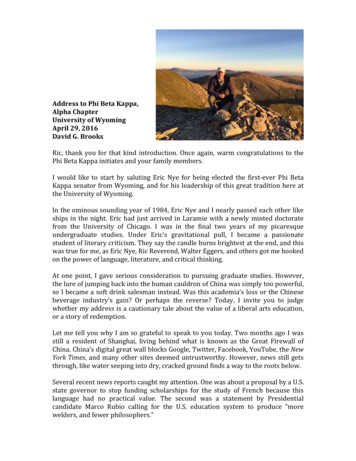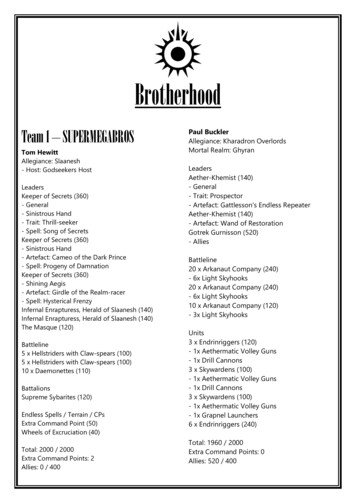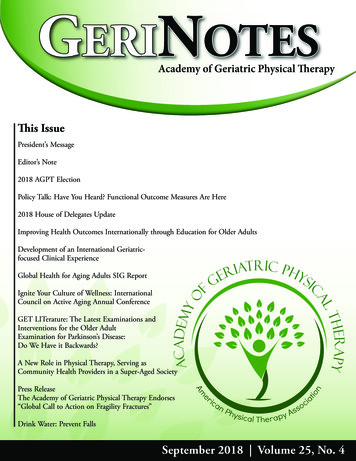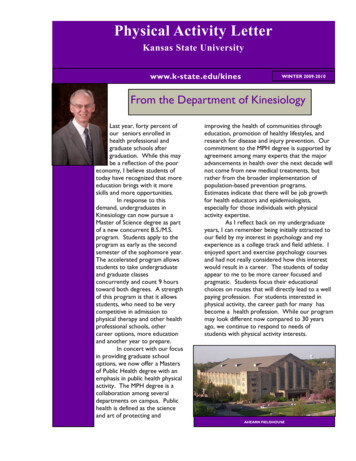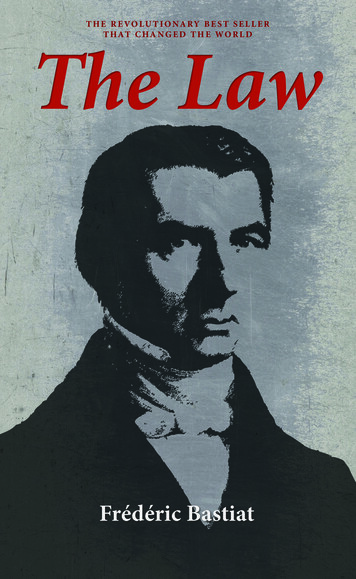
Transcription
T H E R E VO LU T I O NA RY B E S T S E L L E RT H AT C H A N G E D T H E W O R L DFrédéric Bastiat
The LawFrédéric BastiatTranslated from the French by Dean RussellForeword by Connor BoyackLibertas InstituteSalt Lake City, Utah
The LawThis translation of Frédéric Bastiat’s work is copyrighted and usedunder permission of the Foundation for Economic Education. Theforeword, index, and any other material included are licensed undera Creative Commons Attribution-ShareAlike 3.0 Unported License.LIBERTAS PRESS770 E. MAIN STREET, SUITE 255LEHI, UT 84043The Law / Frédéric Bastiat — 1st ed.First printing, July 2013Cover Design by Ben JenkinsManufactured in the United States of AmericaFor bulk orders, send inquiries to: info@libertasutah.orgISBN-13: 978-0-9892912-0-0
To lovers of liberty andpassionate patriots everywhereMay the cause of libertymarch ever onward
Forewordby Connor BoyackFew books are as punchy, persuasive, and effective as theone you now hold in your hands. Though The Law waspublished only months before his early death in 1850,Frédéric Bastiat’s insights and analyses are as relevanttoday as they were in his own time.As Bastiat wrote regarding mid-nineteenth centuryFrance, the law today is likewise “guilty of the evils it issupposed to punish.” Taxpayer-financed bailouts exemptbig banks and other corporations from the consequencesof their own actions. Militarized police officers harmand kill innocent people daily in a failed “war on drugs.”People are spied on, molested at the airport, and denieddue process when accused of a crime in our post-9/11world. Democracy is spread abroad using bombs, anddictators are subsidized through foreign aid. The list isunfortunately quite lengthy.We often call such actions “Orwellian” in reference toGeorge Orwell’s classic novel 1984, but perhaps a newterm is needed to recognize the enduring principlesBastiat packed into this work. Most of the evilsperpetuated by governments today were rebutted andrejected, in one form or another, in his writings.I have found no better method of encouraging peopleto learn about and embrace the principle of individualliberty than to refer them to The Law. Many friends andv
associates can trace the development of their politicalphilosophy back to Bastiat. We owe him a great deal.Seeing the success of the socialists in his own day,Frédéric Bastiat employed creative analogies andblistering arguments to expose their popular rhetoricfor the fraud that it was. Collectivism was as pervasivethen as it is today. He saw the injustice of their policiespermeate through government, and in his rebuttalsBastiat’s deep concern about justice is evident—truejustice, “simple and clear, precise and bounded,” as hewrote. With plenty of examples to illustrate his point, heconcluded that the “law, instead of checking injustice,becomes the invincible weapon of injustice.” Historyvalidates his assertion far too easily.Perhaps most important in this book is the clarity withwhich Bastiat explains how government, as a creation ofman, cannot exceed its creator. “Life, liberty, and propertydo not exist because men have made laws,” he writes. “Onthe contrary, it was the fact that life, liberty, and propertyexisted beforehand that caused men to make laws inthe first place.” Thus, the state cannot legitimately wieldauthority that the individuals who comprise it do nothave. People cannot justifiably use government, originallya tool of protection, to violate somebody’s rights. Despitethis fundamental axiom, the state proclaims itselfomnipotent and a democratic majority imposes whateverit wishes upon the dissenting minority, with no thoughtor care of principled boundaries.Bastiat will have none of this. He argues that the properrole of government is effectively limited only to “thecollective organization of the individual right of lawfulvi
defense,” since that right predates government andis inherent in each individual who can then delegateit to the government they choose to organize. Lawsbased upon this foundation oblige a person “only toabstain from harming others,” and “violate neither hispersonality, his liberty, nor his property.” In short, agovernment that legitimately protects our lives, liberty,and property, must necessarily be quite constrained.Contrast that minimal scope against the staggering sizeand invasiveness of the modern state, and we witness thedegree to which society has strayed from the ideas in thisbook. Of course, these ideas are not new; the principlesthat Bastiat summarizes so well were widely championedby many in America’s founding generation, whoenshrined them in the Declaration of Independence.Thus, this nation’s departure from the ideas contained inThe Law are not merely the repudiation of some obscureFrenchman, but the outright rejection of the veryphilosophical system that justified secession from Britainand the revolution that followed.In an earlier essay of his, Bastiat concluded thatgovernment too easily becomes “the great fiction throughwhich everybody endeavors to live at the expense ofeverybody else.” This point is driven home in The Lawwhere the author painstakingly shows how socialismis merely a fancy word for legal plunder, wherein thestate takes property from one group of people andillegitimately transfers it to another.Chaos and institutionalized injustice are the byproductsof a legal system which sanctions plunder, and Bastiatargues that we are all worse off for it. In contrast, hevii
says, government should protect property and allowindividuals to improve their own lives while being ableto rely upon a stable system of recognized and just laws.“No society can exist,” he writes, “unless the laws arerespected to a certain degree.”The central thesis of The Law is that not all “laws” areactually such; only when a government’s mandates arebased on some pre-existing (and properly delegated)individual authority is law just and respectable. Thus,Bastiat writes,“The safest way to make laws respected isto make them respectable.” This is the entire point of thebook: to demonstrate which kinds of laws are worthy ofrespect, and therefore most likely to produce a stable,safe, and prosperous society.Bastiat’s life was cut short by illness, and his politicalsuccess was quite insignificant. Despite these seemingdefeats, the ideas he so eloquently explained in TheLaw and his other works have inspired, educated, andchanged the life course of countless people throughoutthe past century and a half. The cause of liberty in ourday would not have made the advances it has withouthis contributions. Our hope is that The Law will likewiseinspire, educate, and change you.viii
The LawThe law perverted! And the police powers of the stateper verted along with it! The law, I say, not only turnedfrom its proper purpose but made to follow an entirelycontrary purpose! The law become the weapon of everykind of greed! Instead of checking crime, the law itselfguilty of the evils it is supposed to punish!If this is true, it is a serious fact, and moral dutyrequires me to call the attention of my fellow-citizens to it.Life Is a Gift from GodWe hold from God the gift which includes all others.This gift is life—physical, intellectual, and moral life.But life cannot maintain itself alone. The Creator oflife has entrusted us with the responsibility of preserving,developing, and perfecting it. In order that we mayaccomplish this, He has provided us with a collectionof marvelous faculties. And He has put us in the midstof a variety of natural resources. By the appli cation ofour faculties to these natural resources we convert theminto products, and use them. This process is necessary inorder that life may run its appointed course.Life, faculties, production—in other words,individuality, liberty, property—this is man. And in spiteof the cunning of art ful political leaders, these three giftsfrom God precede all human legislation, and are superiorto it.Life, liberty, and property do not exist because menhave made laws. On the contrary, it was the fact that life,liberty, and property existed beforehand that caused mento make laws in the first place.1
What Is Law?What, then, is law? It is the collective organization ofthe individual right to lawful defense.Each of us has a natural right—from God—todefend his person, his liberty, and his property. These arethe three basic requirements of life, and the preservationof any one of them is completely dependent upon thepreservation of the other two. For what are our facultiesbut the extension of our individuality? And what isproperty but an extension of our faculties?If every person has the right to defend—even byforce—his person, his liberty, and his property, then itfollows that a group of men have the right to organizeand support a common force to protect these rightsconstantly. Thus the principle of collec tive right—itsreason for existing, its lawfulness—is based on individualright. And the common force that protects this collec tive right cannot logically have any other purposeor any other mission than that for which it acts as asubstitute. Thus, since an individual cannot lawfully useforce against the person, liberty, or property of anotherindividual, then the common force—for the samereason—cannot lawfully be used to destroy the person,liberty, or property of individuals or groups.Such a perversion of force would be, in both cases,contrary to our premise. Force has been given to us todefend our own individual rights. Who will dare to saythat force has been given to us to destroy the equal rightsof our brothers? Since no indi vidual acting separately canlawfully use force to destroy the rights of others, does itnot logically follow that the same princi ple also appliesto the common force that is nothing more than theorganized combination of the individual forces?2
If this is true, then nothing can be more evident thanthis: The law is the organization of the natural right oflawful defense. It is the substitution of a common forcefor individual forces. And this common force is to doonly what the individual forces have a natural and lawfulright to do: to protect persons, liber ties, and properties;to maintain the right of each, and to cause justice to reignover us all.A Just and Enduring GovernmentIf a nation were founded on this basis, it seems to methat order would prevail among the people, in thoughtas well as in deed. It seems to me that such a nationwould have the most simple, easy to accept, economical,limited, non-oppressive, just, and enduring governmentimaginable—whatever its political form might be.Under such an administration, everyone wouldunderstand that he possessed all the privileges as wellas all the responsibili ties of his existence. No one wouldhave any argument with gov ernment, provided that hisperson was respected, his labor was free, and the fruitsof his labor were protected against all unjust attack.When successful, we would not have to thank the statefor our success. And, conversely, when unsuccessful,we would no more think of blaming the state for ourmisfortune than would the farmers blame the statebecause of hail or frost. The state would be felt only by theinvaluable blessings of safety pro vided by this concept ofgovernment.It can be further stated that, thanks to the nonintervention of the state in private affairs, our wants andtheir satisfactions would develop themselves in a logicalmanner. We would not see poor families seeking literary3
instruction before they have bread. We would not seecities populated at the expense of rural dis tricts, nor ruraldistricts at the expense of cities. We would not see thegreat displacements of capital, labor, and population thatare caused by legislative decisions.The sources of our existence are made uncertain andpre carious by these state-created displacements. And,furthermore, these acts burden the government withincreased responsibili ties.The Complete Perversion of the LawBut, unfortunately, law by no means confines itselfto its proper functions. And when it has exceeded itsproper func t ions, it has not done so merely in someinconsequential and debatable matters. The law hasgone further than this; it has acted in direct oppositionto its own purpose. The law has been used to destroy itsown objective: It has been applied to annihi lating thejustice that it was supposed to maintain; to limiting anddestroying rights which its real purpose was to respect.The law has placed the collective force at the disposal ofthe unscrupulous who wish, without risk, to exploit theperson, lib erty, and property of others. It has convertedplunder into a right, in order to protect plunder. And ithas converted lawful defense into a crime, in order topunish lawful defense.How h a s t h i s p e r v e r s i on of t h e l aw b e e naccomplished? And what have been the results?The law has been perverted by the influence oftwo entirely different causes: stupid greed and falsephilanthropy. Let us speak of the first.4
A Fatal Tendency of MankindSelf-preser vation and self-development arecommon aspi rations among all people. And if everyoneenjoyed the unre stricted use of his faculties and thefree disposition of the fruits of his labor, social progresswould be ceaseless, uninterrupted, and unfailing.But there is also another tendency that is commonamong people. When they can, they wish to liveand prosper at the expense of others. This is no rashaccusation. Nor does it come from a gloomy anduncharitable spirit. The annals of history bear witnessto the truth of it: the incessant wars, mass migrations,religious persecutions, universal slavery, dishonestyin com merce, and monopolies. This fatal desire has itsorigin in the very nature of man—in that primitive,universal, and insup pressible instinct that impels him tosatisfy his desires with the least possible pain.Property and PlunderMan can live and satisfy his wants only by ceaselesslabor; by the ceaseless application of his faculties tonatural resources. This process is the origin of property.But it is also true that a man may live and satisfyhis wants by seizing and consuming the products of thelabor of others. This process is the origin of plunder.Now since man is naturally inclined to avoid pain—and since labor is pain in itself—it follows that menwill resort to plunder whenever plunder is easier thanwork. History shows this quite clearly. And under theseconditions, neither religion nor morality can stop it.When, then, does plunder stop? It stops when itbecomes more painful and more dangerous than labor. It5
is evident, then, that the proper purpose of law is to usethe power of its collec tive force to stop this fatal tendencyto plunder instead of to work. All the measures of the lawshould protect property and punish plunder.But, generally, the law is made by one man or oneclass of men. And since law cannot operate without thesanction and support of a dominating force, this forcemust be entrusted to those who make the laws.This fact, combined with the fatal tendency thatexists in the heart of man to satisfy his wants withthe least possible effort, explains the almost universalperversion of the law. Thus it is easy to understand howlaw, instead of checking injustice, becomes the invincibleweapon of injustice. It is easy to under stand why the lawis used by the legislator to destroy in varying degreesamong the rest of the people, their personal indepen dence by slavery, their liberty by oppression, and theirproperty by plunder. This is done for the benefit of theperson who makes the law, and in proportion to thepower that he holds.Victims of Lawful PlunderMen naturally rebel against the injustice of whichthey are victims. Thus, when plunder is organized bylaw for the profit of those who make the law, all theplundered classes try somehow to enter—by peacefulor revolutionary means—into the making of laws.According to their degree of enlightenment, these plun dered classes may propose one of two entirely differentpur poses when they attempt to attain political power:Either they may wish to stop lawful plunder, or they maywish to share in it.Woe to the nation when this latter purpose prevails6
among the mass victims of lawful plunder when they, inturn, seize the power to make laws!Until that happens, the few practice lawful plunderupon the many, a common practice where the rightto participate in the making of law is limited to a fewpersons. But then, partici pation in the making of lawbecomes universal. And then, men seek to balance theirconflicting interests by universal plunder.Instead of rooting out the injustices found insociety, they make these injustices general. As soon asthe plundered classes gain political power, they establisha system of reprisals against other classes. They do notabolish legal plunder. (This objective would demandmore enlightenment than they possess.) Instead, theyemulate their evil predecessors by participating inthis legal plunder, even though it is against their owninterests.It is as if it were necessary, before a reign of justiceappears, for everyone to suffer a cruel retribution—some for their evil n ess, and some for their lack ofunderstanding.The Results of Legal PlunderIt is impossible to introduce into society a greaterchange and a greater evil than this: the conversion of thelaw into an instrument of plunder.What are the consequences of such a perversion?It would require volumes to describe them all. Thuswe must content ourselves with pointing out the moststriking.In the first place, it erases from everyone’s consciencethe distinction between justice and injustice.No society can exist unless the laws are respected to7
a cer tain degree. The safest way to make laws respectedis to make them respectable. When law and moralitycontradict each other, the citizen has the cruel alternativeof either losing his moral sense or losing his respect forthe law. These two evils are of equal consequence, and itwould be difficult for a person to choose between them.The nature of law is to maintain justice. This is somuch the case that, in the minds of the people, law andjustice are one and the same thing. There is in all of us astrong disposition to believe that anything lawful is alsolegitimate. This belief is so widespread that many personshave erroneously held that things are “just” because lawmakes them so. Thus, in order to make plunder appearjust and sacred to many consciences, it is only necessaryfor the law to decree and sanction it. Slavery, restric tions,and monopoly find defenders not only among those whoprofit from them but also among those who suffer fromthem.The Fate of Non-ConformistsIf you suggest a doubt as to the morality of theseinstitu tions, it is boldly said that “You are a dangerousinnovator, a utopian, a theorist, a subversive; you wouldshatter the founda tion upon which society rests.”If you lecture upon morality or upon politicalscience, there will be found official organizationspetitioning the government in this vein of thought:“That science no longer be taught exclu sively from thepoint of view of free trade (of liberty, of property, andof justice) as has been the case until now, but also, inthe future, science is to be especially taught from theviewpoint of the facts and laws that regulate Frenchindustry (facts and laws which are contrary to liberty, to8
property, and to justice). That, in government-endowedteaching positions, the professor rigor ously refrain fromendangering in the slightest degree the respect due to thelaws now in force.”*Thus, if there exists a law which sanctions slaveryor monopoly, oppression or robbery, in any formwhatever, it must not ever be mentioned. For how canit be mentioned without damaging the respect which itinspires? Still further, morality and political economymust be taught from the point of view of this law; fromthe supposition that it must be a just law merely becauseit is a law.Another effect of this tragic perversion of the lawis that it gives an exaggerated importance to politicalpassions and con flicts, and to politics in general.I could prove this assertion in a thousand ways. But,by way of illustration, I shall limit myself to a subjectthat has lately occupied the minds of everyone: universalsuffrage.Who Shall Judge?The followers of Rousseau’s school of thought—whocon sider themselves far advanced, but whom I considertwenty cen turies behind the times—will not agree withme on this. But uni versal suffrage—using the word inits strictest sense—is not one of those sacred dogmaswhich it is a crime to examine or doubt. In fact, seriousobjections may be made to universal suffrage.In the first place, the word universal conceals agross fal lacy. For example, there are 36 million people*General Council of Manufacturers, Agriculture, and Commerce,May 6, 1850.9
in France. Thus, to make the right of suffrage universal,there should be 36 mil lion voters. But the most extendedsystem permits only 9 million people to vote. Threepersons out of four are excluded. And more than this,they are excluded by the fourth. This fourth per s onadvances the principle of incapacity as his reason forexclud ing the others. Universal suffrage means, then,universal suf frage for those who are capable. But thereremains this question of fact: Who is capable? Areminors, females, insane persons, and persons who havecommitted certain major crimes the only ones to bedetermined incapable?The Reason Why Voting Is RestrictedA closer examination of the subject shows us themotive which causes the right of suffrage to be basedupon the supposi tion of incapacity. The motive is that theelector or voter does not exercise this right for himselfalone, but for everybody.The most extended elective system and the mostrestricted elective system are alike in this respect. Theydiffer only in respect to what constitutes incapacity. It isnot a difference of principle, but merely a difference ofdegree.If, as the republicans of our present-day Greekand Roman schools of thought pretend, the right ofsuffrage arrives with one’s birth, it would be an injusticefor adults to prevent women and children from voting.Why are they prevented? Because they are presumedto be incapable. And why is incapacity a motive forexclusion? Because it is not the voter alone who suf fersthe consequences of his vote; because each vote touchesand affects everyone in the entire community; because10
the peo ple in the community have a right to demandsome safeguards concerning the acts upon which theirwelfare and existence depend.The Answer Is to Restrict the LawI know what might be said in answer to this; whatthe objec t ions might be. But this is not the place toexhaust a controversy of this nature. I wish merely toobserve here that this contro versy over universal suffrage(as well as most other political questions) which agitates,excites, and overthrows nations, would lose nearly all ofits importance if the law had always been what it oughtto be.In fact, if law were restricted to protecting allpersons, all liberties, and all properties; if law werenothing more than the organized combination of theindividual’s right to self defense; if law were the obstacle,the check, the punisher of all oppression and plunder—isit likely that we citizens would then argue much aboutthe extent of the franchise?Under these circumstances, is it likely that the extentof the right to vote would endanger that supreme good,the public peace? Is it likely that the excluded classeswould refuse to peaceably await the coming of their rightto vote? Is it likely that those who had the right to votewould jealously defend their privilege?If the law were confined to its proper functions,everyone’s interest in the law would be the same. Is it notclear that, under these circumstances, those who votedcould not inconvenience those who did not vote?11
The Fatal Idea of Legal PlunderBut on the other hand, imagine that this fatalprinciple has been introduced: Under the pretense oforganization, regula tion, protection, or encouragement,the law takes property from one person and gives it toanother; the law takes the wealth of all and gives it toa few—whether farmers, manufacturers, shipowners,artists, or comedians. Under these circumstances, thencertainly every class will aspire to grasp the law, and logi cally so.The excluded classes will furiously demand theirright to vote—and will overthrow society rather than notto obtain it. Even beggars and vagabonds will then proveto you that they also have an incontestable title to vote.They will say to you:“We cannot buy wine, tobacco, or salt withoutpaying the tax. And a part of the tax that we pay is givenby law—in privi leges and subsidies—to men who arericher than we are. Others use the law to raise the pricesof bread, meat, iron, or cloth. Thus, since everyone elseuses the law for his own profit, we also would like to usethe law for our own profit. We demand from the lawthe right to relief, which is the poor man’s plunder. Toobtain this right, we also should be voters and legislatorsin order that we may organize Beggary on a grand scalefor our own class, as you have organized Protection ona grand scale for your class. Now don’t tell us beggarsthat you will act for us, and then toss us, as Mr. Mimerelproposes, 600,000 francs to keep us quiet, like throwingus a bone to gnaw. We have other claims. And any way,we wish to bargain for ourselves as other classes havebar gained for themselves!”And what can you say to answer that argument!12
Perverted Law Causes ConflictAs long as it is admitted that the law may bediverted from its true purpose—that it may violateproperty instead of protect ing it—then everyone willwant to participate in making the law, either to protecthimself against plunder or to use it for plunder. Politicalquestions will always be prejudicial, dominant, andall-absorbing. There will be fighting at the door of theLegislative Palace, and the struggle within will be no lessfurious. To know this, it is hardly necessary to examinewhat transpires in the French and English legislatures;merely to understand the issue is to know the answer.Is there any need to offer proof that this odiousperversion of the law is a perpetual source of hatred anddiscord; that it tends to destroy society itself? If suchproof is needed, look at the United States [in 1850].There is no country in the world where the law is keptmore within its proper domain: the pro tection of everyperson’s liberty and property. As a consequence of this,there appears to be no country in the world where thesocial order rests on a firmer foundation. But even in theUnited States, there are two issues—-and only two—thathave always endangered the public peace.Slavery and Tariffs Are PlunderWhat are these two issues? They are slavery andtariffs. These are the only two issues where, contrary tothe general spirit of the republic of the United States, lawhas assumed the character of a plunderer.Slavery is a violation, by law, of liberty. The protectivetariff is a violation, by law, of property.13
It is a most remarkable fact that this double legalcrime—a sorrowful inheritance from the Old World—should be the only issue which can, and perhaps will,lead to the ruin of the Union. It is indeed impossible toimagine, at the very heart of a society, a more astoundingfact than this: The law has come to be an instrument ofinjustice. And if this fact brings terrible conse quences tothe United States—where the proper purpose of the lawhas been perverted only in the instances of slavery andtariffs—what must be the consequences in Europe, wherethe per version of the law is a principle; a system?Two Kinds of PlunderMr. de Montalembert [politician and writer]a d opt i n g t h e t h ou g ht c ont a i n e d i n a f a m ou sproclamation by Mr. Carlier, has said: “We must makewar against socialism.” According to the definition ofsocialism advanced by Mr. Charles Dupin, he meant:“We must make war against plunder.”But of what plunder was he speaking? For there aretwo kinds of plunder: legal and illegal.I do not think that illegal plunder, such as theft orswin dling—which the penal code defines, anticipates,and pun ishes—can be called socialism. It is not this kindof plunder that systematically threatens the foundationsof society. Anyway, the war against this kind of plunderhas not waited for the command of these gentlemen.The war against illegal plunder has been fought sincethe beginning of the world. Long before the Revo lution of February 1848—long before the appearanceeven of socialism itself—France had provided police,judges, gen darmes, prisons, dungeons, and scaffoldsfor the purpose of fighting illegal plunder. The law itself14
conducts this war, and it is my wish and opinion that thelaw should always maintain this attitude toward plunder.The Law Defends PlunderBut it does not always do this. Sometimes thelaw defends plunder and participates in it. Thus thebeneficiaries are spared the shame, danger, and scruplewhich their acts would otherwise involve. Sometimesthe law places the whole apparatus of judges, police,prisons, and gendarmes at the service of the plun derers,and treats the victim—when he defends himself—as acriminal. In short, there is a legal plunder, and it is of this,no doubt, that Mr. de Montalembert speaks.This legal plunder may be only an isolated stainamong the legislative measures of the people. If so, itis best to wipe it out with a minimum of speeches anddenunciations—and in spite of the uproar of the vestedinterests.How to Identify Legal PlunderBut how is this legal plunder to be identified? Quitesimply. See if the law takes from some persons whatbelongs to them, and gives it to other persons to whomit does not belong. See if the law benefits one citizen atthe expense of another by doing what the citizen himselfcannot do without committing a crime.Then abolish this law without delay, for it is no
Frédéric Bastiat’s insights and analyses are as relevant today as they were in his own time. As Bastiat wrote regarding mid-nineteenth century France, the law today is likewise “guilty of the evils it is supposed to punish.” Taxpayer-financed bailouts exempt big banks and other corporations from the consequences of their own actions.

